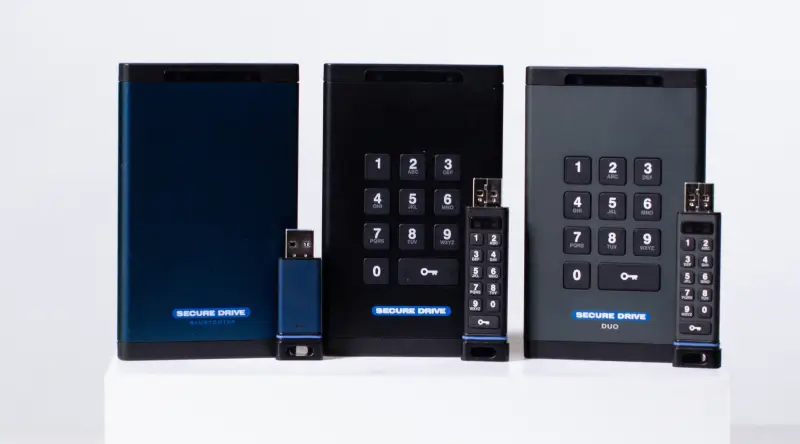Cyber attacks are growing in both scale and sophistication. This rise makes data protection one of the greatest challenges of our time. Traditional defenses remain important, but they are no longer sufficient on their own. Encrypted drives have emerged as a critical security measure. By encoding stored data, these devices prevent unauthorized access to sensitive information. Even if the hardware falls into the wrong hands.
SecureData, the leader in data security solutions, explains why encrypted external drives are essential to defend against modern threats.
Cost of Ransomware and Security Breaches
How we work, communicate, and store information constantly changes. Yet, a reliance on data has created fertile ground for cybercriminals.
Ransomware is forecast to cost victims around $275 billion annually by 2031. The report projects a new attack every 2 seconds as bad actors refine their malware payloads and extortion activities. Threats no longer rely on brute-force techniques alone. Instead, they exploit weak endpoints, poorly secured networks, and even human error.
One of the most overlooked risks is data at rest. A lost laptop, a stolen external drive, or an improperly decommissioned server can hand cybercriminals direct access to sensitive records without the need for sophisticated hacking techniques. Traditional defenses are critical, but they mostly address active intrusions. They do little to protect data if an attacker bypasses measures or gains physical access.
Encrypted external drives and flash drives close this gap by ensuring that even if devices are lost, stolen, or compromised, the data is still safeguarded.
When threats are both digital and physical, encryption is not simply an enhancement. It is a necessity.
How Encrypted Drives Work
At its core, encryption transforms readable data (plaintext) into an unreadable format (ciphertext) through complex algorithms. Only someone with the correct decryption key can unlock the data. For storage devices, the information remains useless to unauthorized parties.
There are two main types of drive encryption:
- Hardware-Based Encryption. Self-encrypting drives (SEDs) include a built-in processor that automatically encrypts and decrypts data as it is written or read. Because the process occurs within the drive itself, there is minimal impact on system performance. These drives often use AES (Advanced Encryption Standard) with 256-bit keys, recognized worldwide as a gold standard in data security.
- Software-Based Encryption. In this method, encryption is handled by applications installed on the host device. While flexible and cost-effective, software solutions can be more vulnerable to malware attacks and may consume additional system resources.
A key advantage of modern encrypted drives is their transparent operation. Once authenticated, typically through a password, PIN, biometric input, or security token, the drive behaves like any standard storage device. Users don’t need to run additional programs or manually encrypt files.
6 Reasons Encrypted Drives Enhance Cybersecurity
Encrypted drives provide more than just a technical upgrade; they deliver a multi-layered defense that protects sensitive information across different scenarios.
1. Protection Against Data Theft in Case of Device Loss or Theft
Lost or stolen devices remain one of the most common causes of a data breach. Without encryption, a thief only needs to connect the drive to another system to access its contents. Encrypted drives render the stolen hardware worthless, as the data cannot be read without the encryption key. This is particularly crucial for employees who travel frequently with laptops or carry external drives containing sensitive information.
2. Defense Against Unauthorized Access and Insider Threats
Not all threats come from outside. Employees, contractors, or other insiders may intentionally or accidentally expose data. Encrypted drives enforce strict access controls, ensuring that even individuals with physical possession of a device cannot bypass authentication.
3. Compliance with Data Privacy Regulations
Regulations such as GDPR in Europe, HIPAA in the U.S. healthcare sector, and PCI DSS for payment processing mandate strong data protection measures. Encrypted drives help organizations achieve compliance by protecting data at rest, thereby reducing liability in the event of a breach. In many cases, regulators may not classify a lost encrypted drive as a reportable incident, provided the encryption meets recognized standards.
4. Mitigation of Ransomware Damage
Ransomware typically encrypts files, then the attackers demand payment for decryption. While drive encryption does not stop malware from executing, it can limit the attack surface. For example, encrypted backups stored offline on secure drives remain protected from ransomware propagation, ensuring recovery options without paying a ransom.
5. Securing Sensitive Backups and Archives
Data backups are a last line of defense during outages, breaches, or disasters. However, backup drives are often overlooked in security planning and stored in less secure environments. Encrypted drives safeguard backups by ensuring that long-term archives cannot be accessed without authorization — even if they are physically stolen or misplaced.
6. Enhanced Trust in Business Operations
For organizations, securing customer data is not only a legal obligation but also a matter of reputation. Clients, partners, and regulators increasingly expect robust data protection measures. Deploying encrypted drives demonstrates a proactive approach to cybersecurity, strengthening trust and minimizing reputational risk in the event of an incident.
Additional Benefits Beyond Security
While the primary purpose of encrypted drives is safeguarding data, they also deliver a range of secondary benefits that improve usability, efficiency, and business resilience.
Maintaining Performance While Securing Data
Modern encrypted drives leverage hardware-based encryption, which performs cryptographic operations directly within the device. This minimizes any noticeable slowdown for the user. Businesses no longer need to choose between speed and security — encrypted drives offer both.
Simple Deployment and Management at Scale
For IT administrators, implementing encryption across hundreds or thousands of endpoints once posed a logistical challenge. Today’s drives often integrate with centralized management platforms, allowing organizations to enforce encryption policies, reset authentication credentials, and monitor compliance remotely.
Integration with Enterprise Systems
Encrypted drives can be combined with existing enterprise security frameworks, such as multi-factor authentication (MFA) and identity access management (IAM) systems. This creates layered defenses where encrypted hardware works hand in hand with network monitoring and endpoint detection tools.
Cost-Efficiency in the Long Run
Although encrypted drives may carry a higher upfront cost than standard devices, they significantly reduce financial exposure to data breaches, regulatory penalties, and reputational harm. In this sense, they are not just a technical upgrade but also a cost-saving investment in long-term risk management.
Future-Proofing Against Evolving Threats
As attackers adopt more advanced techniques, encryption remains one of the few defenses that scales with them. By deploying encrypted drives now, organizations position themselves to withstand new forms of attacks, including those targeting cloud backups, remote work devices, and edge computing nodes.
Encryption and the Role of Recovery Specialists
By protecting data at rest, preventing unauthorized access, and ensuring compliance with global regulations, encryption provides a critical layer of defense that traditional security tools cannot offer. The advantages extend beyond security, with benefits for performance, scalability, and long-term cost savings. However, encryption introduces an additional layer of complexity when something goes wrong.
SecureData offers specialized security solutions tailored precisely to meet your needs. Talk to an expert today to learn more about our SecureDrive® products.

















